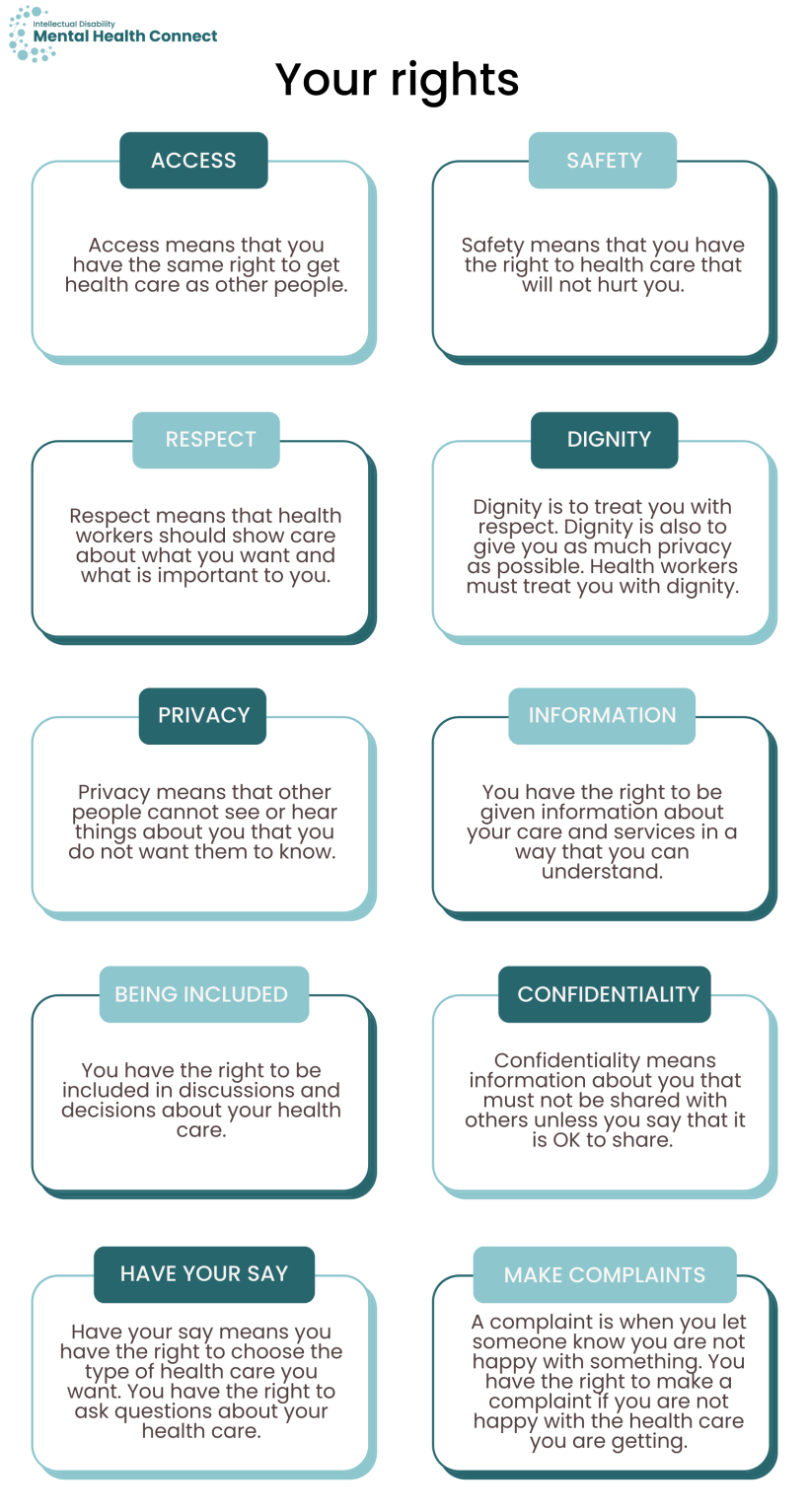Your rights
Jump to a section below
Key points
- Rights are rules about how everyone should be treated fairly. A right is something everyone has.
- You have a right to good mental health care.
- People who support you should do certain things to make sure you get good health care.
- You can ask someone for support if you are not happy with the help you are getting for your mental health.
Rights are rules about how everybody should be treated fairly. A right is something everyone has. Everyone has the right to have good mental health and get mental health care.
Rights about people with disabilities are in the UN Convention on the Rights of Persons with Disabilities. This is a set of rules that Australia and many other countries have agreed to.
Doctors and mental health workers must give people with intellectual disability good mental health care.
Your rights when getting help for your mental health
Below are your rights when getting help from health services. This includes mental health services.

- Access
Access means that you have the same right to get health care as other people.
- Safety
Safety means that you have the right to health care that will not hurt you.
- Respect
Respect means that health workers should show care about what you want and what is important to you.
- Dignity
Dignity is to treat you with respect. Dignity is also to give you as much privacy as possible. Health workers must treat you with dignity.
- Privacy
Privacy means that other people cannot see or hear things about you that you do not want them to. For example, your medical records are kept safely locked away.
- Information
You have the right to be given information about your health in a way that you can understand.
- Being included
You have the right to be included in discussions and decisions about your health care.
- Confidentiality
Confidentiality means that information about you must not be shared with others unless you say that it is OK to share. Anything you tell health workers will be kept confidential unless there is a good reason to share information such as:
- you say it is OK
- you or other people are in danger
- the law says they must.
- Have your say
Have your say means you have the right to choose the type of health care you want. You have the right to ask questions about your health care.
- Making complaints
A complaint is when you let someone you are not happy with something. You have the right to make a complaint if you are not happy with the health care you are getting.
You can find more information about making complaints in this Easy Read sheet and in How to advocate.
For more information on your rights you can go to these websites:
- The Council for Intellectual Disability also has a fact sheet on your rights called Your right to good health care.
- The Australian Government’s healthdirect website has some information and a video on your health care rights
- If you have to go to hospital for your mental health or have a Community Treatment Order (known as a CTO), 3DN have made some Easy Read resources here.
Advocacy
Advocacy is having your voice heard so your rights and needs are met. You can have needs in many areas of your life.
You can be a self-advocate. A self-advocate is someone who speaks up for themselves.
You may want to find an advocate to help you speak up for your rights. An advocate is someone who helps you to speak up and get the support you need.
You may need to advocate if you cannot find support for your mental health, or if you are not happy with the service you are getting.
You can find out more about advocacy and how to find an advocate in How to advocate.
Resources
- The Council for Intellectual Disability also has a fact sheet on your rights called Your right to good health care.
- The Australian Government’s healthdirect website has some information and a video on your health care rights.
- If you have to go to hospital for your mental health or have a Community Treatment Order (known as a CTO), 3DN have made some Easy Read resources here.
- You can find more information about making complaints in this Easy Read sheet.